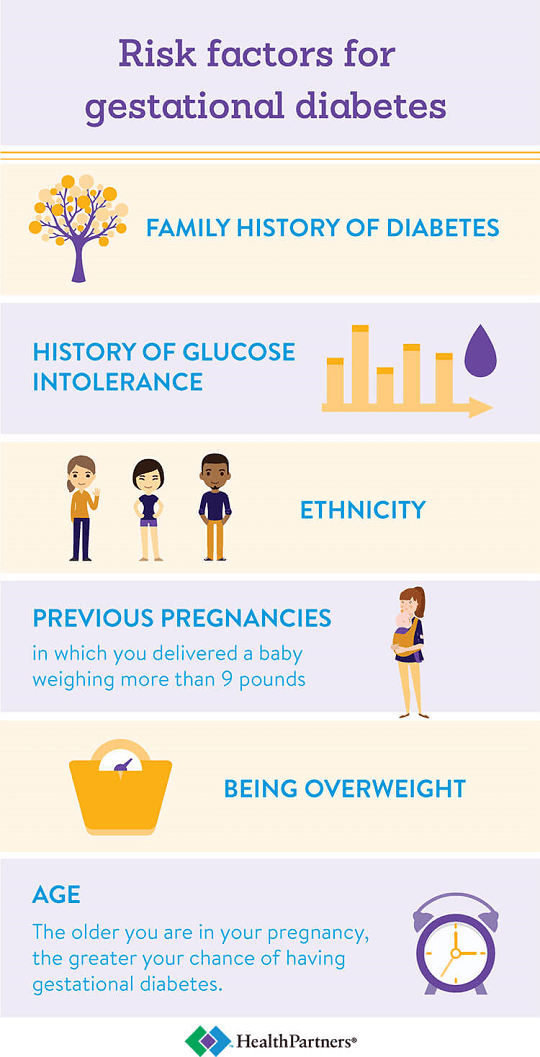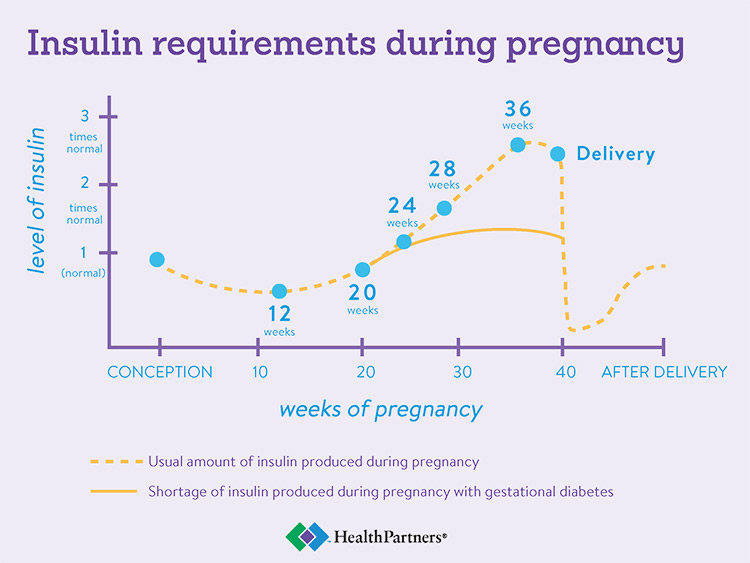You’ve been making really good food choices so your baby has the right nutrients to grow healthy and strong. But, sometimes you treat yourself to a big bowl of potato chips or an extra piece of chocolate. You’re pregnant and you deserve it, right? The panic sets in when you find out you have an upcoming test for gestational diabetes. Could eating these treats give me gestational diabetes?
What is gestational diabetes?
If your glucose levels are too high, you may have gestational diabetes. Gestational diabetes is a type of diabetes that only pregnant women can get. Roughly 1 in 20 women have gestational diabetes during their pregnancy.
Here’s how it works: After you eat, your body turns the food in your stomach into glucose in your bloodstream. Your pancreas then chips in to help. It creates a hormone called insulin, which allows the glucose to go from your bloodstream and into your cells to give you a much-needed energy boost.
When you’re pregnant, your body needs more insulin than it usually does for this process to happen. If your pancreas can’t keep up, the glucose levels in your blood will get too high. This is gestational diabetes. Since your baby shares your bloodstream while in the womb, keeping your glucose levels under control will make sure your baby stays healthy, too.
[Click on the image below to enlarge and view it in a new window]
Although there are common symptoms for type 1 and type 2 diabetes, such as excessive thirst, frequent urination, fatigue and unintended weight loss, there are typically no symptoms for gestational diabetes. But, there are a few risk factors that your doctor will be on the lookout for in your first trimester.

How do I know if I have gestational diabetes? There’s a test for that.
There aren’t any symptoms for gestational diabetes. All pregnant women are tested for the disease somewhere between 24-28 weeks. Here’s what you’ll do when you take the gestational diabetes test:
- After one of your routine doctor’s appointments, you’ll be asked to visit the clinic laboratory.
- The lab tech will give you a sugary drink and after drinking it you’ll wait for one hour in the waiting room. This gives your body time to digest the drink so we can see how your body is handling glucose.
- When your hour is up, you’ll get your blood drawn and your glucose levels will be tested. Your doctor will share your results usually within 1-2 days.
If your glucose levels are high, don’t panic. This just means you’ll need to schedule another appointment at the lab to take a longer glucose test so we can take a closer look. Here’s what to expect:
- First, you’ll need to fast for 12 hours before the test. Don’t try to fool the test. Altering your diet in anticipation for the test doesn’t work.
- You’ll come back to the lab and have your blood drawn once you arrive. Then, you’ll drink the sugary drink and wait for one hour.
- After that hour, you’ll get your blood drawn again. Then, you’ll go back to the waiting room and wait for a second hour. After the second hour, you’ll get your blood drawn again. Then you’ll wait for a third hour and get your blood drawn at the end of the third hour.
- Your doctor will share your results usually within 1-2 days.
If your glucose levels are still high after this longer glucose test, then you’ll be paired with a diabetes educator and dietitian to develop a plan to manage your gestational diabetes.
How can I prevent gestational diabetes?
Are you worried about the extra scoop of ice cream you had last night? Just because you eat a certain type of food doesn’t mean you’ll automatically get gestational diabetes. In fact, there’s no surefire way to prevent gestational diabetes. Even mothers who have had gestational diabetes in a previous pregnancy may not get it with a later pregnancy. But, women who are overweight and less active are more likely to get gestational diabetes. That’s why maintaining an active lifestyle and making healthy food choices throughout your pregnancy is important for you and your baby. When your sweet tooth hits, try fruit instead of a sugary snack. Instead of reaching for that soda, take a drink of water instead. Get out and enjoy the fresh air with a daily walk to stretch your muscles and clear your mind.
There are a lot of pressures on you during your pregnancy to do what’s best for your baby. One of the ways you can keep your baby healthy is by getting tested for gestational diabetes, and managing it if you have it. Look at it like a blessing in disguise and make the lifestyle changes that will benefit you and your growing family long after pregnancy.
